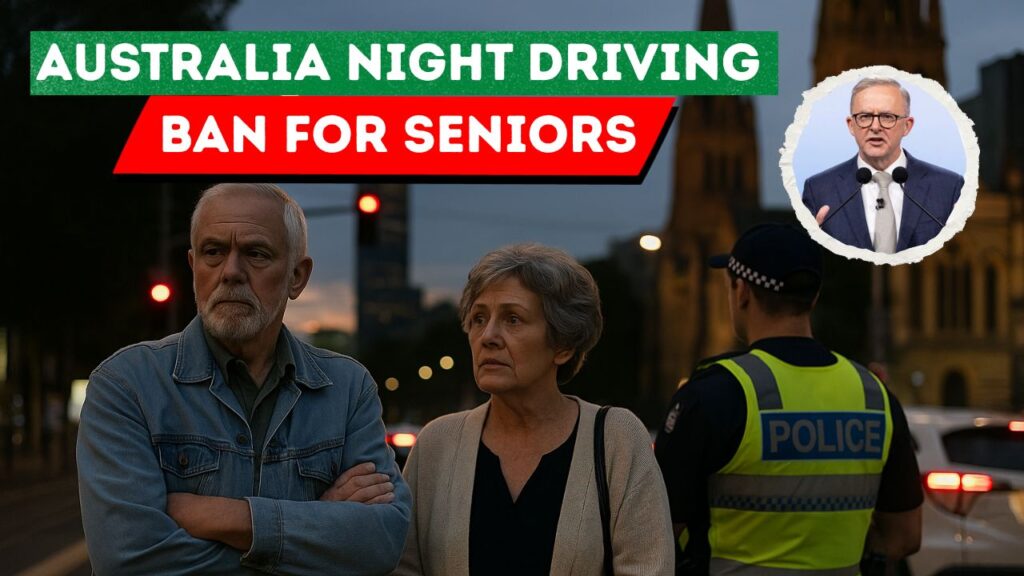In a move aimed at improving road safety, Australia has introduced a new night driving curfew for senior drivers over 60. This rule, expected to take effect soon, focuses on limiting high-risk driving during late-night hours. The government believes this initiative will help reduce accidents involving elderly drivers by imposing restrictions when visibility is low and alertness is compromised. With enforcement guidelines clearly laid out and exemptions included for essential travel, the policy strikes a balance between safety and personal independence. Here’s what seniors, families, and communities need to know about this important update to Australia’s driving laws.

Who Will Be Affected by the Senior Night Driving Curfew?
The new regulation specifically targets drivers aged over 60, especially those with a history of vision problems, recent accidents, or medical conditions affecting reaction times. The curfew is expected to apply from 10 PM to 5 AM in most states, though some local governments may adjust the timing based on traffic data. Authorities believe that driving after dark presents unique risks for older adults due to reduced visibility and slower reflexes. While this doesn’t mean a complete ban, it does require affected seniors to apply for curfew exemptions if they need to travel for work, emergencies, or healthcare reasons. The policy reflects growing concern over road safety trends involving seniors.
How Will the Curfew Be Enforced by Australian Authorities?
Enforcement of the senior night curfew will involve a combination of police patrols, license checks, and automated number plate recognition (ANPR) systems. Seniors flagged for violations could face fines or temporary suspensions, especially if caught repeatedly driving during prohibited hours without valid exemptions. Authorities have emphasized a soft rollout in the first few months to allow awareness and adjustments. Educational materials and official notices will be distributed to registered senior drivers, helping them understand the curfew’s scope. For those still unsure, local transport offices will offer helplines and appointments to discuss curfew rules and exemptions in person or online.
Exemptions and Medical Considerations Under the New Driving Rule
Recognizing that a full night driving ban may disrupt important routines, the government has allowed several key exemption categories. Seniors commuting for work, attending night medical appointments, or involved in caregiving can apply for special permits through a simple online form. Those with vision test clearance or recent safe driving history may also be granted flexibility. In rural areas, where access to transport alternatives is limited, local councils may issue broader exemptions. Doctors can submit supporting documents if a driver is medically fit to handle night driving. This blend of safety with compassion ensures older Australians aren’t unfairly restricted by the new law.
What Should Seniors Do to Stay Compliant and Safe?
To comply with the new curfew, seniors should first confirm if the law applies to them based on age, health, and state of residence. The best approach is to schedule non-urgent trips during daylight, and to maintain regular vision and health checkups. If night travel is essential, they must apply for exemption permits well in advance. Keep a printed or digital copy of the exemption in the vehicle at all times to avoid fines during checks. For added peace of mind, family members are encouraged to help elderly relatives stay informed about rule changes and requirements. Responsible planning can ensure freedom of movement while respecting public safety efforts.
| Detail | Information |
|---|---|
| Curfew Start Date | 1 November 2025 |
| Affected Age Group | 60 years and older |
| Curfew Hours | 10:00 PM to 5:00 AM |
| Exemptions Available | Yes (medical, work, caregiving) |
| Penalty for Violation | Fines up to AUD 250 |
| Enforcement Method | Police checks, ANPR, road patrols |
Who is affected by the new curfew?
All senior drivers aged 60 and above may be subject to the rule.
Can seniors still drive at night?
Yes, but only with approved exemptions for essential reasons.
How can exemptions be applied for?
Through a state transport website or in-person office visit.
Will this curfew apply nationwide?
Most states will adopt it, but local variations may exist.




